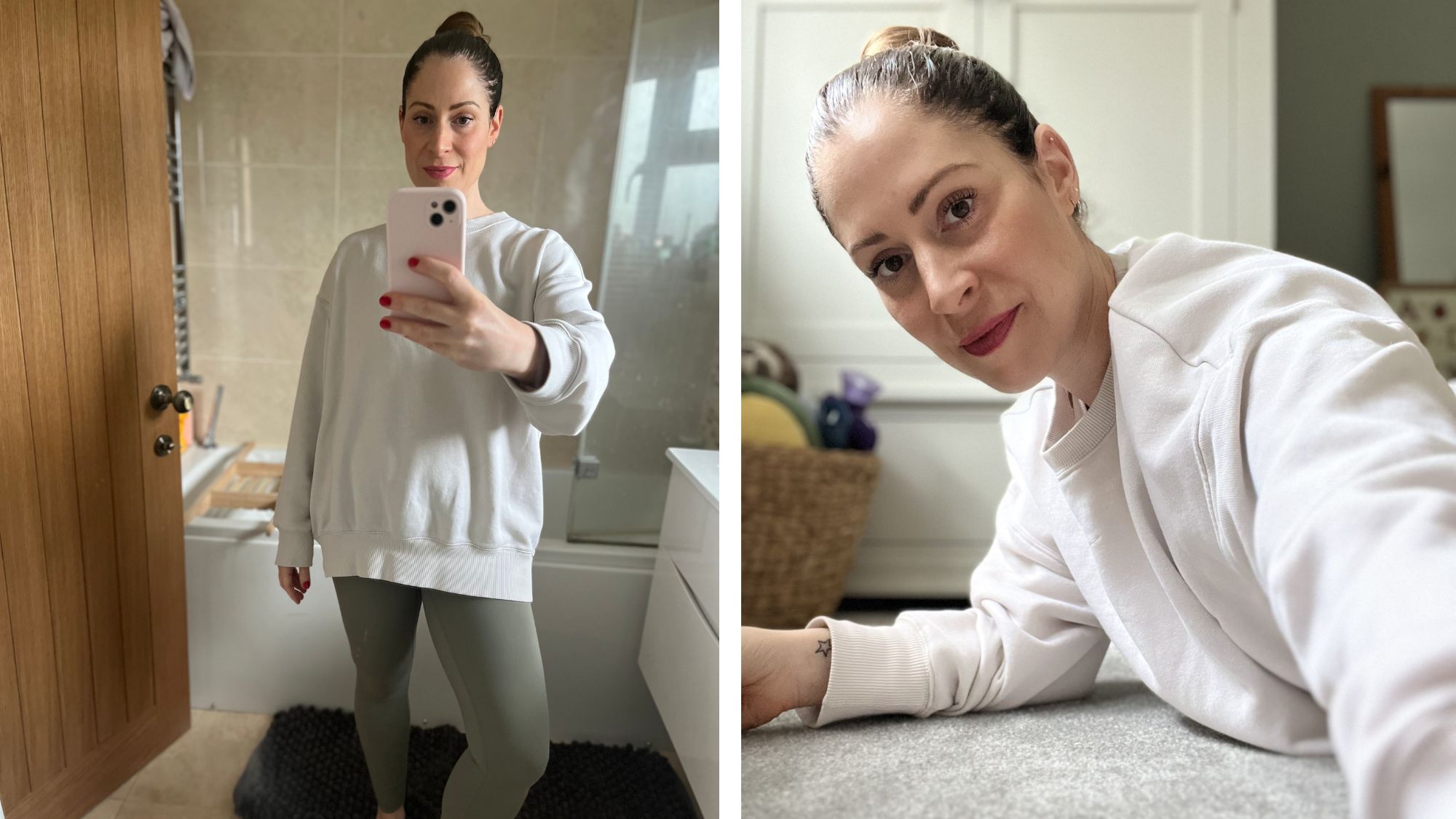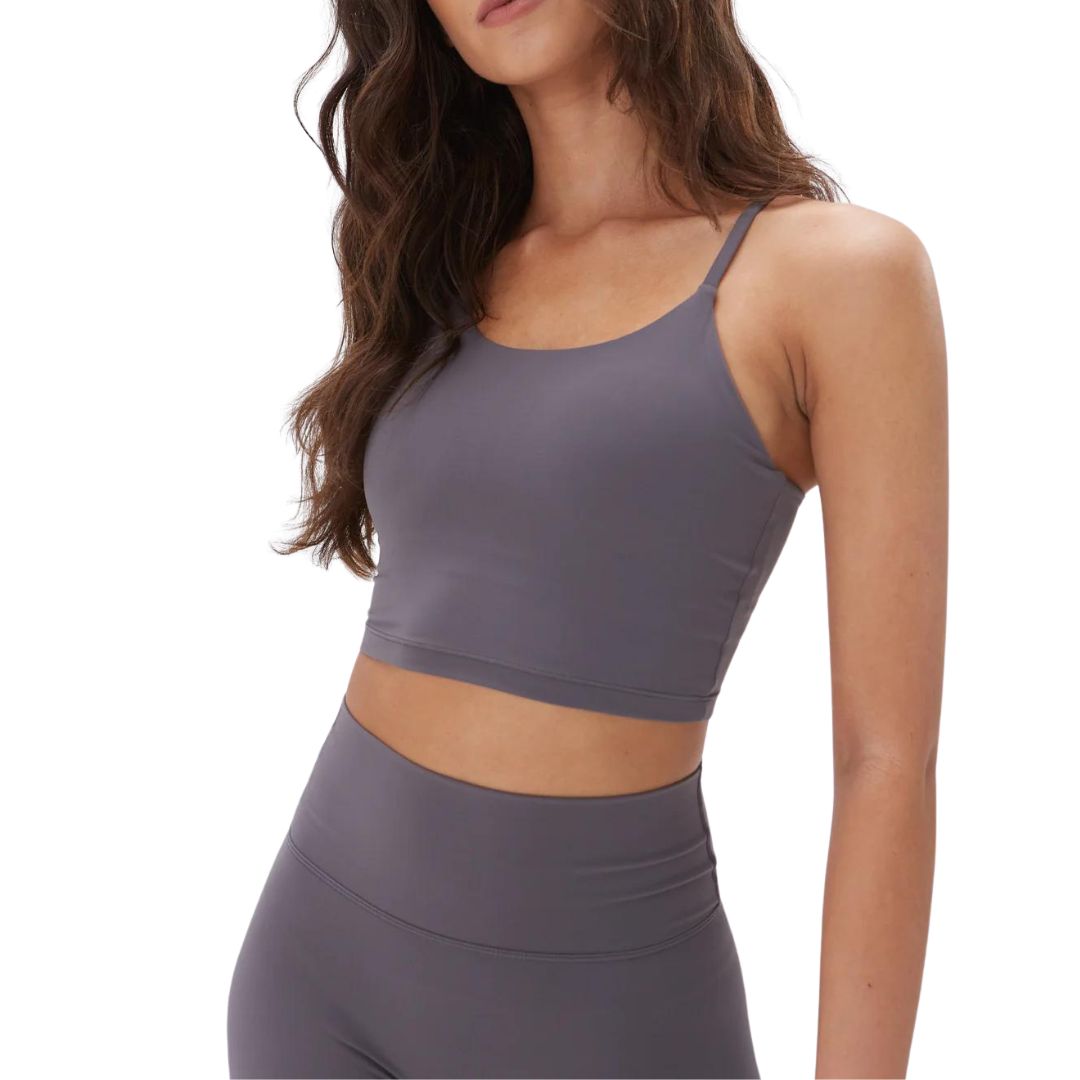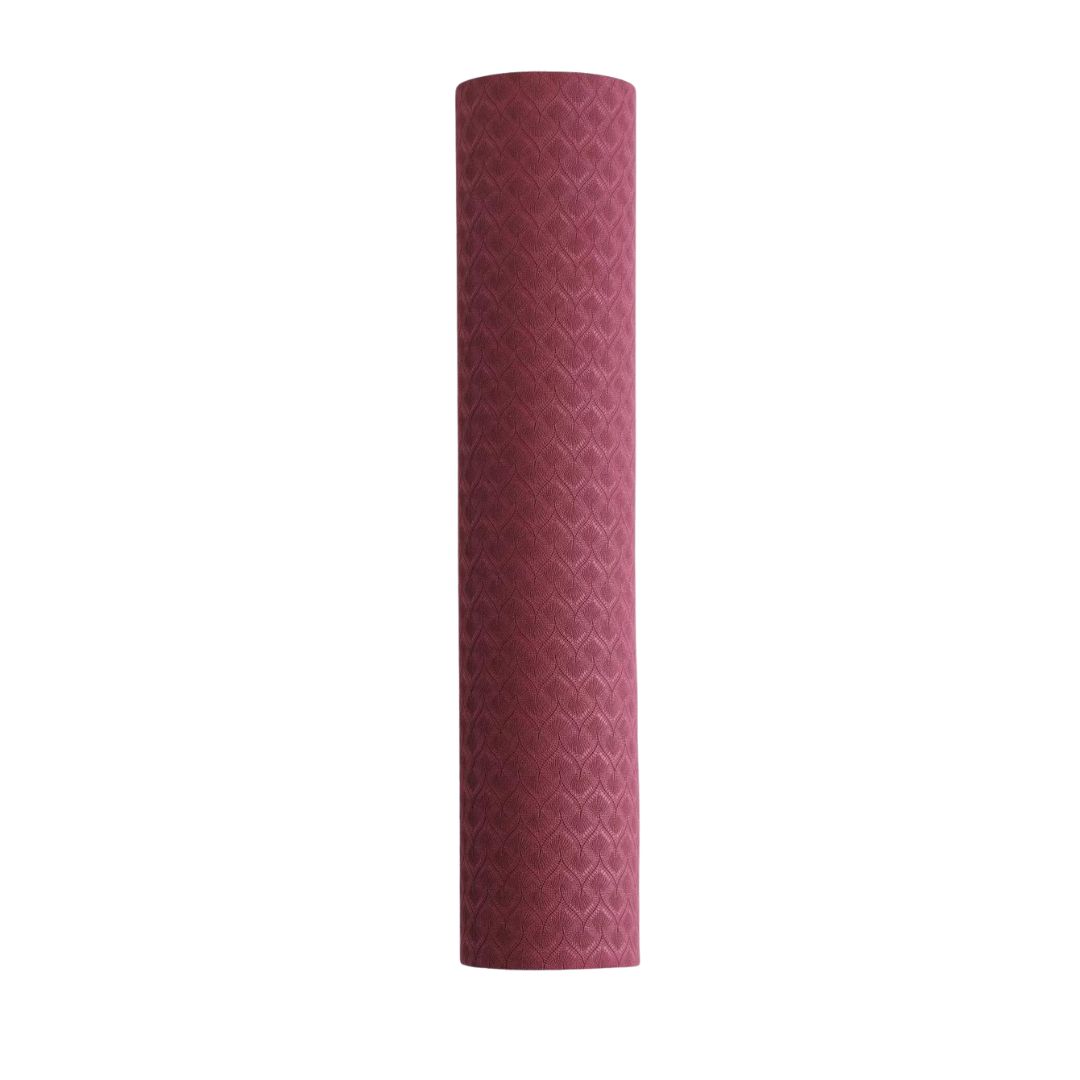I've never managed a push-up so did them every day for a week - and the gains I've noticed are way more than physical
Full push up mode: activated.


Celebrity news, beauty, fashion advice, and fascinating features, delivered straight to your inbox!
You are now subscribed
Your newsletter sign-up was successful
Full disclosure: even as a Health Writer, I’ve never been able to master a full push-up. I consider myself to be fairly strong, fit and healthy, working out around four to five times a week, doing a combination of cardio (running and spin), strength training (weights and Barre) and mobility (Pilates and yoga) and yet, the push-up remains elusive. Is it my probably-less-than-average core strength (three children, what can I say)? Or are my arms weaker than I believe? Or maybe it’s a combination of lots of factors – regardless, I feel my inability to perform this move is a chink in my fitness armour, and one I’m keen to close up.
So, when I was asked to spend a week trying to master a full push-up, I jumped at the chance. Would seven days be enough time to show at least some improvement? To be clear, I can already comfortably do a few sets of push-ups on my knees, so I’m not starting entirely from scratch, but honestly, it feels like I am.
Why bother, you ask? Well – there are loads of good reasons for adding push-ups to your exercise repertoire, and it’s not just about looking good in the gym (although if that’s your motivation, you do you). Research (such as this study, published in The Journal of the American Medical Association) shows that not only do push-ups improve upper body strength and muscular endurance, but they may also reduce your risk of developing cardiovascular disease (although it's worth noting that this study was only performed on men).
Here at Marie Claire UK, we're no strangers to being your fitness guinea pigs, having completed week-long challenges with bodyweight lunges, bodyweight squats, Bulgarian split squats and more. That said, for me, this challenge is purely personal – call it stubbornness, I’m determined to complete at least one full push-up before the week is out. Read on to find out how I get on – along with our guides to low-impact strength training, strength training for beginners and strength training at home.
And if your interest in home workout challenges really is piqued, you might also like to read how our Senior Health Editor Ally Head got on when she tried strength training every other day. Spoiler alert: she loved it.
I tried to master a full push-up by doing them every day for a week – here’s how I got on
What is a full push-up?
First things first, let’s talk about what a push-up actually is. Most of us will be familiar with the move as a common strength training exercise, but for the uninitiated – the push-up is where you begin lying prone and raise your whole body up onto your hands and feet.
Spoiler alert: it’s not for the faint-hearted. Yep, a full push-up is a hard-core move. “A push-up is a challenging bodyweight exercise that targets multiple muscle groups,” agrees personal trainer Beth Davies. “Even though you’ll feel like it’s targeting the chest, shoulders and triceps, in fact (when performed correctly) you’re engaging most parts of the body in the move, from core to those all-important tiny stabilising muscles in the arms and legs.”
Celebrity news, beauty, fashion advice, and fascinating features, delivered straight to your inbox!
Having heard this, I must admit feeling slightly less rubbish about my inability to master them. But why should we be pushing ourselves to attempt them? I needed to know some tangible benefits, to motivate myself when things got tough.
What are the benefits of a full push-up?
A solid, low-impact strength training move, the humble push-up has a myriad of benefits, which honestly - I'd never really considered before.
1. They boost upper body strength
As you’d expect, push-ups are a boon for upper body strength, working those arms, shoulders and chest. Studies show that making small adjustments to hand position can alter which muscles work hardest, with the chest muscles engaged more when the hands are placed inwards, while the triceps take the brunt when the hands are placed outwards.
2. They’re great for our posture
And if you’re guilty of slouching while you tap away at a screen all day (me too), there’s even more reason to try your hand at push-ups – they’re great for improving posture and shoulder health, reducing the risk of neck and back niggles.
3. They improve core strength
But more than this, they’re great for improving core strength – vital for injury prevention, and functional movement.
“Push-ups are an excellent core strengthening move,” explains Davies. “Firstly, the core muscles have to work to keep the body in a straight line. The top of a push-up is essentially a plank - which is a great exercise for strengthening the core, while the whole move requires dynamic stabilisation as you move through it, meaning the core muscles must adjust to control the movement."
4. They’re accessible
Good news for beginners – you don’t need any equipment to start with, although you might want to invest in one of the best gym mats that's both comfy and grippy.
Push-ups are free and you can do them almost anywhere (clean floor permitting).
How to perform a push-up with correct form
As with any and all other exercises, to get the most bang for your buck and to prevent injury, it’s crucial to perform the move correctly – perhaps even more so for a full push-up, as you’re unlikely to manage one if your form is off.
So, before attempting the challenge, I spent some time quizzing PTs for their top technique tips. Here's how they're done:
- Start in a high plank position with hands slightly wider than shoulders and feet around hip width apart. Fingers should be pointed forwards or slightly outwards.
- Keeping your body in a straight line (and without hips going upwards or sagging downwards) engage your core muscles.
- Maintain a neutral spine, and lower your body by bending the elbows and keeping them close to your body until your chest touches or almost touches the floor.
- Push back up to the starting position maintaining a straight line, extending your arms without locking out your elbows at the top.
- Avoid saggy hips, arching your back or flared elbows - modify if needed!
Not quite up to a full? There’s great news – knee push-ups still provide plenty of benefits. According to this research published in The Journal of Applied Biomechanics, knee push-ups do provide significant benefits in building and maintaining upper body and core strength. So, whatever your ability level, there are gains to be had.
I tried to master a full push-up by doing them every day for a week – here’s how I got on
Benefits memory banked and technique honed, I couldn’t delay the inevitable any longer – it was time to get started.
Days one to three
Given that I regularly (read: always) work out at home, I planned to simply add some time into my usual weekly exercise regime to attempt some push-ups. A master of procrastination, to begin with, I figured it made sense to add them to the end of my workout, thinking that I’d be warmed up and more mobile.
Readers, things didn't work out quite as I'd hoped. Already fatigued from a particularly brutal Barre class, my arms weren't playing ball (FYI: the lying down part at the beginning of the push-up? Nailed it.) Undeterred, I decided to ease myself into the challenge by doing three sets of ten knee push-ups - and this still felt pretty tough.
So, on day two I tried a different tack. I still completed some brief warm up exercises, but after a few minutes of mobility exercises, I tried again. Fresher arms aside - these things are hard.
Confidence (and motivation) waning, I went back to the experts for advice and soon realised that I wasn't engaging my core properly, so I was essentially missing out on a powerhouse of force. They also suggested stepping up to the challenge gradually, so rather than going straight from knee to full push-ups, I tried incline push-ups, with my feet on the floor and my hands on the sofa (note to self - it's helpful to wear grippy socks for these).
Knee and incline push-ups in the bag, I kept pushing to achieve a full push-up by the end of the week.
Days four to seven
Luckily for me, day four happened to be a run day so I felt pretty confident I'd still have some juice in my arms and chest after my weekly 5k. But what I wasn't expecting was for my arms to feel sore as I was running - DOMS had kicked in.
That said, once I'd got home and done some stretches, I felt ready to have another crack. Maybe it was a post-run endorphin high, or maybe my three days of modified push-ups had started to take effect - but today, I managed one! On a massive high, I went straight back for more - but turns out, one's my limit (for now).
I spent the rest of the week focussing on my form - the feedback from the experts had been bang on - once I consciously engaged my core, I felt so much stronger. I also slowed the eccentric part of the movement right down - controlling the movement down and not worrying about pushing back up.
And while I found doing any more than two in a row virtually impossible - I'm thrilled that I've finally managed to complete a full push-up, and I've realised that actually, my biggest hurdle was my mindset. I can't believe it only took a few days to achieve - if I'd known, I probably would have attempted them years ago, rather than writing the move off as something I just couldn't do.
And you know what? The gains I've made this week have been more than purely physical. This challenge has been the definition of a growth mindset for me, and while it's safe to say that push-ups are far from my favourite exercise, I'm not going to let all my hard work go to waste. I'll be incorporating at least a few into my weekly routine - and who knows, maybe one day I'll be that girl effortlessly smashing ten push-ups in the gym. Maybe.
Shop MC UK's go-to workout kit now:
What happens if you do push-ups every day?
Well, according to personal trainer Beth Davies you'll be challenging several muscle groups and engaging most parts of your body, including your core and the all-important stabilising muscles in your arms and legs.
“Push-ups are an excellent core strengthening move,” adds Davies. As a result, they're a great bodyweight exercise to add to your rotation if you're looking to build muscle strength or tone.
Do note, though: NHS guidelines advise aiming for two strength sessions a week, so it's important not to overtrain or increase your risk of injury. Depending on your current fitness levels and ability, aiming for two to four workouts is a good baseline for maintaining or improving your fitness.

Anna Bartter is a freelance journalist who writes about health, fitness and women's lifestyle for publications including Women's Health, Stylist, The iPaper, Metro and Psychologies, among others.
She's always on a quest to find a variety of fun and functional workouts that give you the most bang for your workout buck and she's passionate about championing movement for everyone's mental and physical wellbeing.



